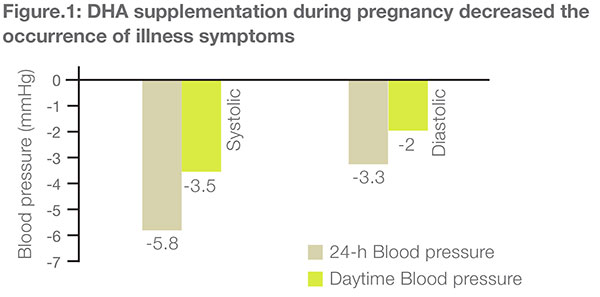Earlier animal studies have reported that the 2 major omega-3 fatty acids, eicosapentaenoic acid (EPA) and docosahexaenoic acid (DHA), might have differential effects on blood pressure BP and heart rate (HR).
This particular study was conducted to assess the differences in the effects of EPA or DHA on ambulatory (BP) and HR in humans.
57 men and women, 21-80 years of age, with fasting HDL levels of ≤ 44 mg/dl (in men) and ≤ 54 mg/dl (in women).
A double-blind, placebo-controlled parallel design trial
6 weeks
4 g/day of DHA, EPA or placebo respectively
DHA therapy significantly reduced the 24-hour and daytime (awake) ambulatory BP (p<0.05).
The 24 h and daytime BP values were found to be reduced by 5.8/3.3.
DHA supplementation reduced 24-h heart rate (HR), daytime HR and nighttime HR by 3. 5±0.8 bpm, 3.7±1.2 bpm, and 2. 8±1.2, respectively.
The EPA supplementation did not show any significance in controlling ambulatory BP or HR.

DHA is the principal omega-3 fatty acid and is associated with significant reductions in ambulatory blood pressure and heart rate. Thus, these results indicate the important implications of DHA for human nutrition and the food industry.
Maki KC, et al. Lipid responses to a dietary docosahexaenoic acid supplement in men and women with below average levels of high density lipoprotein cholesterol. J Am Coll Nutr. 2005; 24(3):189-199.